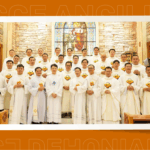It is a sad thing to wake up every day with the feeling that your life resembles an endless standstill. But it is an even heavier burden to open your eyes and realize that every piece of news—whether from the world or from those close to you—seems to take you backward, dragging history and its symbols into their darkest hours. As Albert Camus said, it feels as though every time we push forward, something stronger pushes us back. Much like Sisyphus, the mythical Greek figure condemned to roll a boulder up a mountain only to see it roll back down—his efforts forever in vain. That’s all he understands of life. And this is precisely what many men and women today are experiencing. They do not know where to turn, as the specter of emptiness looms over their dreams.
This Jubilee Year, which Pope Francis—of happy memory—has dedicated as a Year of Hope, is an opportunity to discover what hope can accomplish in a person’s life, especially in the lives of those bearing heavy burdens. One might ask: what keeps so many men and women going despite sometimes unbearable suffering? What makes them manage a faint smile behind seemingly broken faces? After histories of war, ethnic tensions, and even genocide—what allows people to continue living together?
Here we discover hope and all its power. This article aims to briefly reflect on that.
At the Heart of the Drama of Existence
Human existence is often haunted by complex situations of absurdity. Considering the human condition, marked by finitude, loss, and misunderstanding, the German philosopher Arthur Schopenhauer concluded that “life is suffering” (cf. The World as Will and Representation). Without necessarily suggesting the same thing, the Book of Job in the biblical tradition clearly shows that suffering can strike anyone at any time—even the just—and often without apparent reason.
Faced with such “undeserved” suffering, it is only natural for man to experience a legitimate revolt. Job did not passively accept his condition: he wept, cried out, and at times protested. As suffering persists and the situation seems to worsen, man falls into despair; he enters the realm of doubt and lamentation. Job himself cried out: “Cursed be the day I was born, and the night that said: A male child is conceived!” (Job 3:3). He was at the end of his strength; he could not understand the reason for his suffering and thus gave voice to his anguish.
Today’s world puts many of our contemporaries in a similar position, questioning the presence of God and His action in the world. A few years ago, the coronavirus pandemic shook and changed our lives—and to this day, many are still struggling to recover. Hotbeds of violence and war continue to erupt, and we watch helplessly as the world is slowly destroyed. Famine decimates populations in underdeveloped countries. Unemployed youth perish in the Mediterranean, desperately trying to reach the “Promised Land.” The earth itself groans under the weight of human excess, bringing forth environmental disasters. In short, the world is in distress, and the discerning wonder: Are we not already living through the apocalypse?
In the midst of this unpredictability, as Pope Francis says, “we often encounter people who are discouraged and look to the future with skepticism and pessimism, as if nothing could bring them happiness” (Spes non confundit, n.1). It is in this context that the Jubilee call to rekindle hope resounds.
To Hope, to Hope in the Lord
Speaking of Christian hope, we must first clarify that it is not simply a wish for things to get better, nor mere optimism. It is something more: it is to look at life in the light of Christ, to pass through trials holding onto God’s promises—promises that remain firm despite our hardships. This outlook transforms how we see life’s tragedies. Ultimately, it is about trusting in God and His faithfulness.
Christian hope is not based on circumstances themselves, but on God and His promises. It is the firm assurance that we are not alone in what we endure—no matter how difficult or long the suffering may be. Such hope gives strength, allowing us to face trials with courage and confidence. Consequently, it calls us to action—it is not passive. To hope in God is not to wait idly but to keep moving forward, praying, loving, and persevering.
This shows that hope is essential to the journey. It is no coincidence that the late Pope Francis invited all Christians to become pilgrims of hope. To be a pilgrim means knowing we are called to move forward, that life itself is dynamic, and that we must not settle into comfort zones. To hope—and to inspire hope in others—is our mission. This mission proclaims that with God, nothing is fixed forever. Evil does not have the final say—it is temporary, and in Jesus, it has already been defeated. This assurance strengthens us, for, as Scripture says, “those who hope in the Lord will run and not grow weary” (Isaiah 40:31); they do not place a period where God places a comma. The nature of hope is to open pathways where none seem to exist.
To Hope in Order to Forgive and Begin Again
Here emerges a dynamic of conflict resolution relevant to our times. Many hearts are broken; the world is torn apart by wars that undermine peaceful coexistence. Only forgiveness can restore what is broken. Forgiveness is a powerful sign of hope. When the sinner experiences God’s forgiveness, he encounters a God who does not condemn but lifts up, opens the future, and restores life. Indeed, forgiving others is a deeply hopeful act. It is the path to a reconciled future. Forgiveness opens hearts despite the wounds and injustices endured.
“Forgiveness does not change the past and cannot undo what has happened. Forgiveness changes the future and allows us to live differently—without resentment, bitterness, or vengeance. A future enlightened by forgiveness allows us to see the past with different eyes, more serene, even if still clouded with tears” (Spes non confundit, n.23). Forgiveness provides a new starting point.
In Conclusion
We come to understand that the Christian is not called to flee from suffering but to live through it with faith, confident that God is present in every trial. He is not indifferent but in solidarity, bearing human suffering from within—especially since He has united Himself to humanity forever through the Incarnation. What sustains a person, in fact, is this deep assurance that excludes all fatalism. One clings to life and to God’s promises, knowing that such hope does not disappoint. Hope gives life, because truly, to live is to hope.





